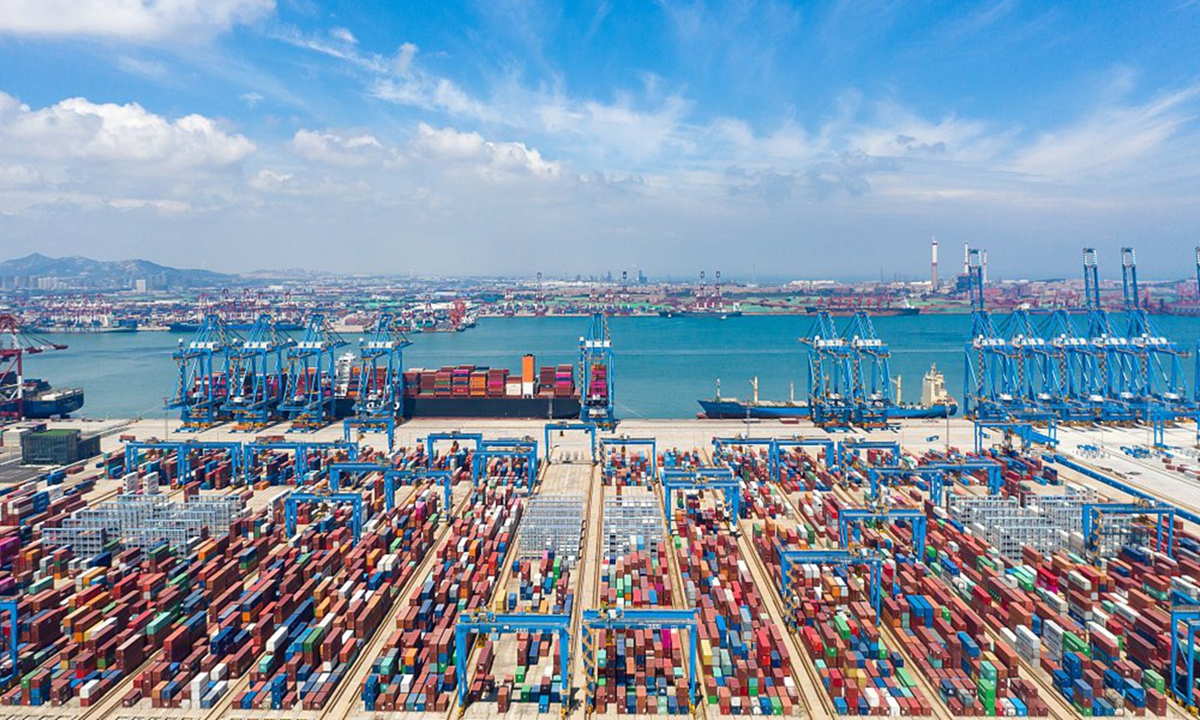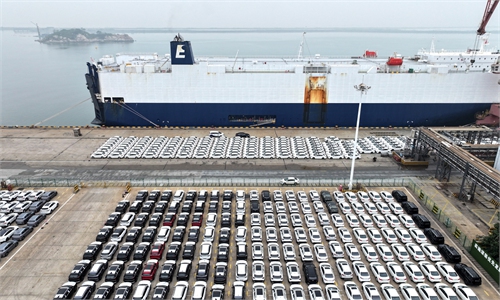China to boost trade cooperation amid global protectionism
Nation aims for FTAs to contribute 40% of foreign trade by 2030

China trade economy File photo: VCG
China is ramping up efforts to promote free trade cooperation by accelerating talks and upgrades of free trade agreements (FTAs) and enhancing the development of its free trade zones (FTZs), the Ministry of Commerce (MOFCOM) said at a press conference on Friday. The acceleration of free trade cooperation sends a strong signal of China's high-level opening-up. In the face of a complex and challenging external environment, the move is crucial for China to stabilize foreign trade in the second half of the year and ensure that it meets its annual economic growth target, experts said.
This also shows China's commitment to supporting multilateralism, maintaining the stability and efficiency of global industrial and supply chains, and providing confidence and certainty to the world economy, they added.
MOFCOM announced at the press conference that it is advancing FTAs with various partners and will strive to increase the proportion of trade volume with FTA partners to around 40 percent of its total foreign trade volume by 2030.
MOFCOM said efforts are being made to accelerate the ASEAN-China FTA 3.0 Upgrade Negotiations and FTA talks with countries such as Honduras, El Salvador and New Zealand. It is also promoting the China-Japan-South Korea FTA as well as free trade cooperation with the Gulf Cooperation Council, Norway, Switzerland and Bangladesh.
In the new FTAs to be signed, China will further enhance the level of opening-up in commodity trade, include more products in the zero-tariff list and push for further opening-up in key sectors such as telecommunications, healthcare, and tourism, MOFCOM said.
It is also mulling a comprehensive document to enhance the development of FTZs, and will leverage pilot FTZs to further expand China's opening-up of commodity, service, and capital markets to the world.
Crucial role
MOFCOM's move comes as the current global trade environment is marked by rising uncertainties and trade restrictions, causing a negative impact on global trade.
In order to increase the quality and quantity of foreign trade throughout the year, MOFCOM is utilizing bilateral mechanisms to assist enterprises in addressing unreasonable trade restrictions, support more companies in expanding their international presence and establish a stable and predictable trade policy environment.
MOFCOM will also focus on fostering new growth in foreign trade, improve overall competitiveness and deepen cooperation with trading partners to uphold the stability and efficiency of global industrial and supply chains, it added.
FTAs play a crucial role in stabilizing foreign trade and ensuring China's overall economic growth target for the year, especially in this complex and challenging external environment, experts said.
It provides a stable market environment and convenient trade conditions for foreign trade enterprises, helping them cope with external challenges and maintain stable growth, said Wang Peng, an associate research fellow at the Beijing Academy of Social Science.
Through FTZs, China can attract more foreign investment into the Chinese market and drive industrial upgrading and technological innovation, thereby enhancing the overall competitiveness and sustainable development capability of the economy, Wang said.
Yue Xiangyu, a professor with the Shanghai University of Finance and Economics, told the Global Times on Friday that FTAs typically reduce tariffs, help lower trade costs, and will boost the competitiveness of Chinese products on the global stage.
At the same time, they can help China establish closer trade ties with more countries and regions, explore new markets, diversify trade risks and drive the upgrading of domestic industries, Yue added.
China saw record high foreign trade in the first half of the year, representing a year-on-year increase of 6.1 percent to 21.17 trillion yuan ($2.9 trillion), indicating a positive momentum in the country's foreign trade as well as improvement in the national economy.
Imports in the January-June period totaled 9.04 trillion yuan, up 5.2 percent year-on-year, and exports stood at 12.13 trillion yuan, an increase of 6.9 percent year-on-year.
A survey conducted by MOFCOM of 16,000 key foreign trade and foreign-funded enterprises shows that over 70 percent of enterprises expect an increase in exports for the whole year.
Injecting vitality into world
By accelerating free trade cooperation, China has clearly demonstrated its strong support for opening-up in the face of rising global trade protectionism, injecting vitality and certainty into the world economy, experts said.
MOFCOM said that it will promote the FTA negotiation process with the relevant countries and regions, support more high-quality product imports, and turn China's market into a great opportunity for the world. It will also revise and release regulations for foreign investors' strategic investment in listed companies to attract more high-quality foreign capital into the capital market for long-term investment.
The accelerated development of FTZs and FTAs is a concrete manifestation of China's high-level opening-up to the outside world, said Bai Ming, a research fellow at the Chinese Academy of International Trade and Economic Cooperation.
Utilizing this framework is beneficial for promoting regional integration to release more vitality as it allows all parties to leverage their comparative advantages within the zone, achieve complementary cooperation, and thus solidify the foundation of cooperation, Bai said.

